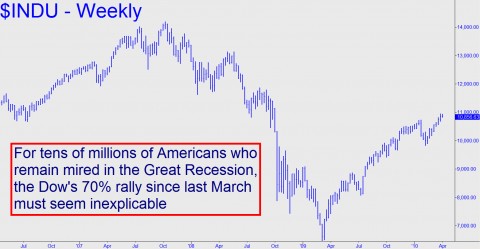Schizophrenia still reigns at the Fed as policymakers attempt to head off an inflation that, statistically speaking, is almost nowhere to be found. In fact, inflation has fallen by more than half since 2007 if you measure it the way the Fed prefers, using a price index of personal consumption expenditures. What is the diligent monetarist supposed to do? While some of the Fed governors see the glass as half-empty and want to keep interest rates low, their delusionally sunny colleagues want to tighten because they evidently believe all of the twaddle we’ve been reading about how the economy is in the throes of a strong recovery. Consider the following headlines from Google’s business-news section yesterday afternoon: “Bets on Growth Buttress Stocks” (Wall Street Journal); “Oil Surges to 17-Month High on Signs of U.S. Economic Growth” (Bloomberg): and, “10-Year Yields Hits 4 Percent on Signs Economy Picking Up” (Reuters). To borrow a line from Goebbels, if the news media keep trying to mislead us with stories like these, eventually we will come to believe them.
Or will we? It’s one thing for the Wall Street Journal et al. to get all stoked about the supposedly robust pace of the recovery. After all, the Journal’s owner, Rupert Murdoch, didn’t get rich telling readers the world was going to hell in a hand basket. But just because Murdoch has chosen to be a cheerleader rather than risk circulation and advertising revenues by giving it to us straight, that doesn’t necessarily mean that we readers have to believe such bilge. Why should we, when there is no hard evidence of a recovery in the economic lives and businesses that we see, and hear about, all around us?
Behind the Headlines
Could the newspapers simply be misinterpreting the signs? It would certainly seem that way. To take the headlines cited above, we see oil’s price surge as having absolutely nothing to do with a pick-up in demand. Rather, the push toward $90 a barrel represents speculative excesses in the futures markets, exacerbated by the reluctance of traders to take short positions. How could they, when, on any given day, a terrorist with a missile launcher could cause the global price of crude to double instantly by scuttling a tanker in the Strait of Hormuz? As for “bets on growth” pushing stocks higher, it is not bullish speculation that has been driving up shares for the last 13 months, but rather a vast excess of liquidity in the financial system. As for the rise in T-Note yields to four percent, we seriously doubt this is being caused by competition from expansion-minded borrowers in the private sector; rather, it comes from the rising apprehension among lenders that they will be repaid in a currency whose value looks all but certain to fall precipitously in the years ahead.
Meanwhile, if the central bankers truly believe that strong economic growth is about to trigger inflation, why do they continue to hold the federal funds rate near zero? The recovery story is a hoax, is why.
(If you’d like to have Rick’s Picks commentary delivered free each day to your e-mail box, click here.)


![Reblog this post [with Zemanta]](http://img.zemanta.com/reblog_b.png?x-id=c3a9ca93-ac48-4418-be22-8432808e7622)
oh, oh photoradarscam, you are making the inflation argument, that could incite a debate again!
Jason: “The Fed cannot keep buying bonds indefinitely.”
Actually, they can. Would they, who knows? Should they, of course not.
Question is, if they did, what would that do, but worse if they did not, what would the interest rates do?
At a 5% rate across the full maturity structure on average, that would be about 650 billion dollars p.a., or ~ double what is incurred now.
Applied to the current budget, it would consist of more deficit than revenue (never happened before, we are at maybe 55% revenue today).
That 5% avg. is moderate, compared to other times, such as late 70s-82. We can’t afford a rate rise, period. Even new taxes wouldn’t help, because they would barely cover new expenditures:
When we start the hot-phase of the Iran war this year (prob. before the Nov. certainly right after the terrorist attack on us by Iran [wonder if they will go for NYC again, or get creative]), things will get pricey quick, and the DOD funding explode yet again. Then there is healthcare, the new money going to students and on, and on.
So, the Fed has plenty of incentives to help out…, and a soft-default is so much more attractive than a hard one.